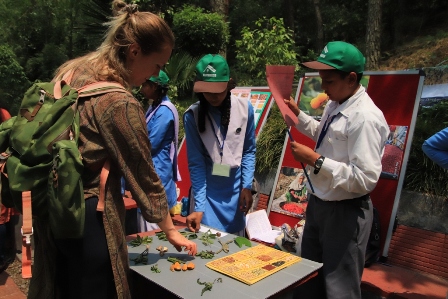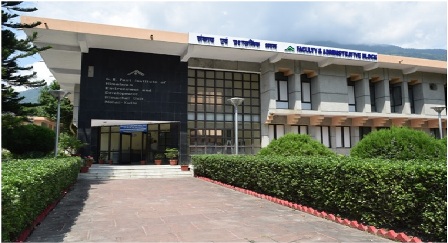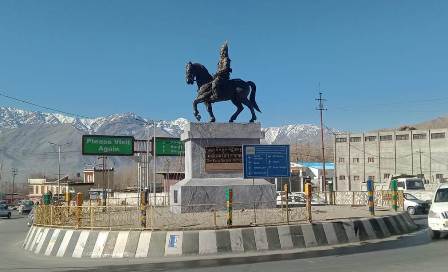Provide access to Rural Technology Center (RTC) of LRC to partner organizations/ stakeholders for demonstration, training, and teaching.
Ladakh Regional Centre (LRC)
- About
- Facilities
- Faculties
- Researchers
- Services
- Major Achievements
- Projects
- Publications
- Activities
- Contact Us
About the Centre
Ladakh Regional Centre of NIHE was established in December, 2019, to ensure research and development outreach in the Trans-Himalayan region of Indian Himalaya. The Trans-Himalayan landscape with most of its areas lying above 3000 m asl is characterised by extreme cold climate, minimal rain and with very sparse vegetation. This landscape, most often, is also termed as ‘Cold Desert’. The region is endowed with rich diversity of culture, unique biodiversity elements and significantly large number of wetlands/water bodies. Although, the communities inhabiting these areas have adapted for extremely harsh climate and resource poor living conditions, they face numerous challenges.
Especially under changing climate scenario, when impacts are expected to be more intense in higher altitudes, the Trans-Himalayan landscape and people are likely to face more sever challenges. This calls for better understanding of its landscape and developing strategies and implementation of plans for addressing issues of environmental conservation, people's livelihoods, and sustainable development under changing scenario. Considering this, the Ladakh Regional Centre of NIHE aims to ensure R&D outreach in Trans-Himalayan region of Indian Himalaya.
Collaborative Institutions
Council
Ladakh Autonomous Hill Development Council, Leh
Government Department
Department of Wildlife Protection, Ladakh (WLPD), Govt. Of Ladakh UT
Institution
Municipal Committee Leh and Kargil, Govt. Of Ladakh UT
Institution
Urban Local Bodies Ladakh UT, Govt. Of Ladakh UT
Institution
University of Ladakh (UoL)
Council
Ladakh Biodiversity Council (LBA)
Institution
Wildlife Conservation and Bird Club of Ladakh (WCBCL)
Institution
Ladakh Ecological Development and Environmental Group (LeDEG)
Focal areas of activities
-Towards bringing changes and achieving the targets, the center is focusing on two cardinal principles: (a) science for society, and (b) networks and collaborations.
- To achieve the targets, centres’ major activities include:
(i) Development of Knowledge Network of institutions/organizations working in the Ladakh &Knowledge Repository for policy inputs on issues of Trans-Himalayan Region.
(ii) Demonstration of successful and sustainable technologiesfor adoption and partnership of private sector.
(iii) Promoting energetic young professionals in providing solutions to address environmental challenges.
Vision
- Promoting alternative livelihoods for climate change vulnerable cold-desert communities
- Facilitating conservation of critical and important cold desert habitats and biodiversity
- Strengthening and establishing approaches for addressing issues of water scarcity
- Fostering climate smart communities in the trans-Himalayan landscape
Objectives
- To develop and upscale of low-cost technologies for sustainable livelihood promotion and dissemination of the developed technologies through capacity building programmes.
- To promote ex-situ conservation of threatened and high-value Trans-Himalayan plants.
- To address water scarcity through integrated water resource management and monitoring of high-altitude wetlands, springs and glaciers.
- To assess climate change impact on the economical marginal societies of Trans-Himalaya and to develop adaptation and mitigation measures.
Facilities
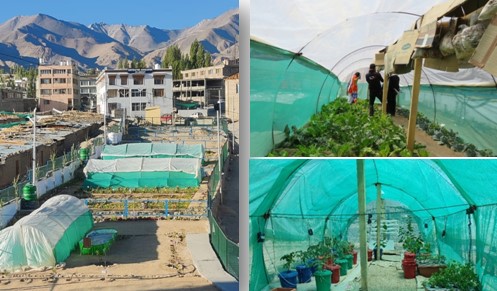
Rural Technology Centre
Rural Technology Center-Leh (RTC-Leh) was established on 19 August 2021 at Council Secretariate Complex to serve as a knowledge centre for education and awareness to harness the rural livelihood opportunities through natural resources.

Climate Monitoring & Modelling
Automatic Weather Station and Numerical Weather Simulation Facility
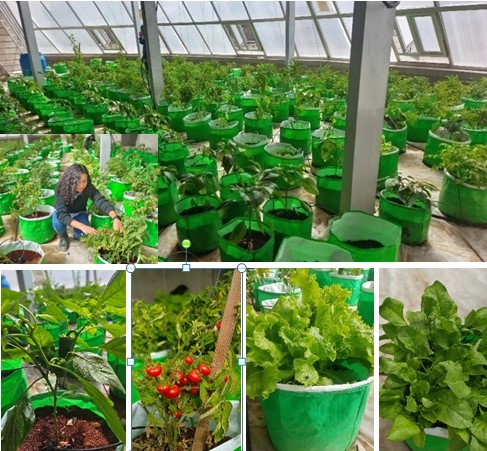
Treated Waste water Hydroponic Proto-type
Treated Waste water Hydroponic Proto-type
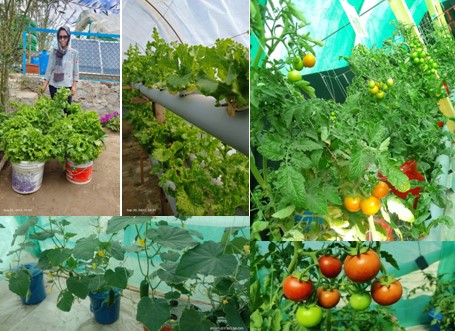
Low-cost Hydroponic Unit
Low-cost Hydroponic Unit
Faculties
Scientist E

Dr. Sandipan Mukherjee
Designation: Scientist E
Discipline: Climate Change ; Meteorology ;
Email Id: sandipanmukherjee@hotmail.com
Scientist C
Dr. Purushottam Kumar Garg
Designation: Scientist C
Discipline: Glaciology ; Remote sensing ;
Email Id: garg.glacio@gmail.com
Scientist-C

Dr. Ajay Kumar Gupta
Scientist C

Dr. Naveen Chandra
Designation: Scientist C
Discipline: Ecology and Biodiversity ;
Email Id: bhattnaveen857@gmail.com
Technical Assistant-II
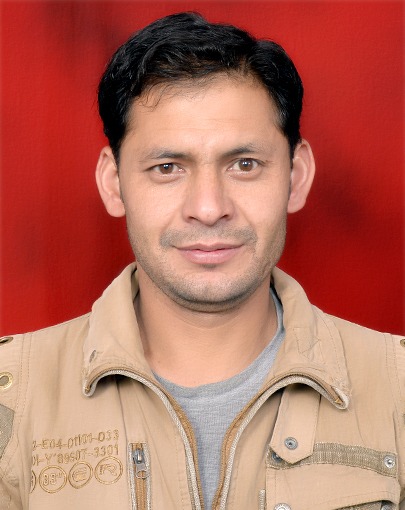
Dr. Dalbeer Pharswan
Designation: Technical Assistant-II
Discipline: Biodiversity Conservation ;
Email Id: dalbeerp3@gmail.com
Researchers
Field Coordinator

Ms. Sonam Chorol
Designation: Field Coordinator
Discipline: Political Science
Email Id: sonamchorol12@gmail.com
Research Associate-III

Dr. Shekhar Singh
Designation: Research Associate-III
Discipline: Hydrology and Water Resources
Email Id: shekharsingh861@gmail.com
Research Associate-I

Ms. Priyanka Lohani
Designation: Research Associate-I
Discipline: Computer Science & Engg.
Email Id: prnklohani@gmail.com
Junior Project fellow

Ms. Jigmet Chuskit Angmo
Designation: Junior Project fellow
Discipline: Botany
Email Id: cangmo9997@gmail.com
Junior Project fellow

Mr. Mohit Prajapati
Designation: Junior Project fellow
Discipline: Glaciology/ Remote Sensing
Email Id: mohitp672@gmail.com
Junior Project Fellow

Mr. Mohd Ilyas
Designation: Junior Project Fellow
Discipline: Geology
Email Id: ilyasladakh978@gmail.com
Junior Project Fellow

Ms. Stanzin Dolma
Designation: Junior Project Fellow
Discipline: Bitechnology
Email Id: stanzindolma130@gmail.com
Project Associate-I

Ms. Rinchen Dolkar
Designation: Project Associate-I
Discipline: Life Science
Email Id: eachen22rchan@gmail.com
Junior Project Fellow

Ms. Anupriya Soni
Designation: Junior Project Fellow
Discipline: Environmental Science
Email Id: annupriyasoni99@gmail.com
Junior Project Fellow

Mr. Aamir Jan Farooq
Designation: Junior Project Fellow
Discipline: Environmental Science
Email Id: aamirfarooq813@gmail.com
Junior Research Fellow

Mr. Ajoy Karmakar
Designation: Junior Research Fellow
Discipline: Remote Sensing & Environmental Science Read more
Email Id: ajoy.iirs@gmail.com
Services
Rural Technology Centre
Analytical Laboratory
Provide laboratory access to local students and researchers from partner organizations/ local stakeholders.
GIS and Statistical Analysis Facility
Provide GIS and Statistical Analysis Facility students and researchers from partner organizations/ local stakeholders.
State Advisory
Provide advisory services to local partner organizations/ stakeholders.
Library and Conference Room
LRC provide library access free to local Students form Local universities and colleges
Researchers’ Hostel
Provide Accommodation to researchers and trainees.
Major Achievements
INTEGRATED WATER RESOURCE MANAGEMENT
Temporal change assessment of glaciers in J&K (UT); and updated glacier mass balance studies for Ladakh (UT). Glacial lake inventory of Kargil district of Ladakh UT. Assessment of long-term meteorological drought scenarios of Ladakh and J&K (UT). Creation of artificial snow reservoir through participatory approach for addressing the rural water scarcity
BIODIVERSITY CONSERVATION AND MANAGEMENT
A comprehensive account of Birds and Mammals of Ladakh (UT) developed using citizen science approach. Accessions of medicinal plants and tree species maintained at Herbal Garden and Mini Arboretum. People Biodiversity Registers for Leh Municipal Committee Leh, Ladakh (UT)
CLIMATE CHANGE ADAPTATION AND MITIGATION MEASURES
Action plans on management and mitigation of disasters in Ladakh UT. A policy document on review, recommendation and action agenda for sustainable tourism in Ladakh UT. Promoting the Carbon Neutral Ladakh Campaign through outreach progammes targeting minimization of single use plastic and tree-based products.
SOCIO ECONOMIC DEVELOPMENT
Rural Technology Centre (RTC)-Leh in collaboration with Ladakh Autonomous Hill Development Council (LAHDC)-Leh developed and demonstrated Trans Himalayan specific low-cost technologies for livelihood improvement i.e. low-cost simple portable polyhouses, low-cost simple solar powered hydroponic prototype, low shading poly-tunnels, biocomposting unit, micro-irrigation model, floriculture through vernalization, integrated pest and nutrient management, integrated vegetable and mushroom cultivation, etc.
<>
Green skill development programmes are being executed to develop local resource based entrepreneurship and to create off-farm livelihood employment opportunities in the remote areas of Ladakh. Since 2020, four major training programs namely (i) Apricot fruit processing, (ii) Seabuckthorn fruit processing, (iii) Basket Weaving, and (iv) Integrated Mushroom cultivation have been organized across 25 villages in Leh and Kargil districts of Ladakh. These programs, tailored to the natural resources available in each village, aimed to enhance capacity and skills, fostering local entrepreneurship and sustainable resource utilization. Till date efforts have yielded positive outcomes, with 623 participants (585 female and 38 male) from 26 villages of Ladakh actively engaging in the training programs
Projects
Ongoing
National Mission for Sustaining the Himalayan Ecosystem Task force on Forest Resources and Plant Biodiversity (TF-3)
Exploring the use of treated wastewater for vegetable cultivation through hydroponic techniques in Ladakh UT.
Assessment of glacier-climate functional relationships across the Indian Himalayan Region through long term network observations.
Strengthening Ladakh’s livelihoods: Empowering selp-help groups (SHGs) through harvesting and primary processing of Seabuckthorn
Natural grassland ecosystem monitoring system for peninsular and trans-Himalayan India to sustain pastoral communities
Multidimensional Assessment of Ecological Dynamics and Ecosystem Health of Selected High-Altitude Wetlands of Indian Himalayan Region (IHR) for Effective Conservation and Management planning.
Mainstreaming Passive Solar Buildings in the Indian Himalayan Region: Integrating science with traditional practices to enhance climate resilience.
Carbon Budget and Eco hydrological Dynamics of selected Himalayan High Altitude Grasslands and Their Carrying Capacity
Completed
Pine-Oak systems: interactions between water-climate and plant biodiversity.
Demonstration of Plastic Free – Rajbhawan Complex, Ladakh.
Timberline and Altitudinal Gradient Ecology of Himalayas, and Human Use Sustenance in a Warming Climate.
Himalaya Calling: Bridging science, policy and practice to foster sustainable development in the Indian Himalayan region (IHR)- Ladakh Chapter.
Carrying Capacity estimation of Tourism in Leh town complex in Ladakh.
People Biodiversity Register of Municipal Committee Leh.
Developing new and improved agriculture techniques (mushroom cultivation) in the GoI-UNDP-GEF SECURE Himalaya Project Landscape in the Union Territory of Ladakh.
Develop educational mini urban arboretum using permanent flower pot container located in main market of Leh town.
Research Articles
In vitro propagation and antioxidant potential of Berberis asiatica from western Himalaya.
Plant Biosystems, 2021
Two hundred years of research on Himalayan biodiversity: Trends, gaps, and policy implications.
Frontiers in Ecology and Evolution, 2021
Anthocyanins, multi-functional natural products of industrial relevance: Recent biotechnological advances.
Biotechnology Advances, 2020
India’s contribution to mitigating the impacts of climate change through vegetation management.
Tropical Ecology, 2020
Predicting Habitat Suitability of Snow Leopards in the Western Himalayan Mountains, India
Theoretical and Applied Economics, 2020
Cucurbita Plants: From farm to industry.
Applied Sciences, 2019
Fate of important medicinal plants in the Eastern Himalaya in changing climate scenarios: A case of Panax pseudoginseng Wall.
Applied Ecology and Environmental Research, 2019/20
Policy Briefs
Disasters and Ladakh: Action Points for Management and Mitigation-2020
Sustainability of Tourism in Ladakh: Review, Recommendation and Action agenda-2020
Activities

Dignitaries’ Visit to the Eco-Friendly Hydroponic Unit of the Ladakh Regional Centre at Bombgarh, Leh ( 11th Oct 2025)
Inauguration of "The Seabuckthorn Processing Unit" at Ladakh Regional Centre of the Institute ( 23rd Sep 2024)
Ladakh Regional Centre of the Institute organized a Workshop titled "Enhancing climate change resilience in the Himalaya: Integrating biodiversity, water resources, sustainable tourism and livelihood" Read more ( 19th Sep 2024)
Institute co-organized a special session on "Mountain Biodiversity - status, impact and livelihood potential in Indian Himalayan Region" in International Conference on “Himalayan Environment In Changing Climate Scenario” with University of Ladakh & World Wildlife Fund Read more ( 19th Sep 2023 -23rd Sep 2023)

Ladakh Regional Centre of the Institute organized a workshop on ' Assessment of Traditional Knowledge on Passive Solar Heated Buildings (PSHB) across Indian Himalayan Region' Read more ( 1st Aug 2023)

As a part of Special Lecture Series, Dr. Ishey Namgyal (President, Municipal Committee Leh) delivered a lecture on Solid Waste Management and Sanitation in Leh, Ladakh at Ladakh Regional Centre of the Institute Read more ( 12th Jul 2023)
Celebration of International Day for Biological Diversity 2023 jointly by Ladakh Regional Centre of the Institute and Municipal Committee Leh (MCL) Read more ( 22nd May 2023)

Introducing products from Seabuckthorn to Tsar-tar ( 23rd Oct 2020 -24th Oct 2020)

Value addition on Seabuckthorn and Apricot Products ( 19th Oct 2020 -20th Oct 2020)

Making of Back Baskets/Dustbins/Small Containers from local plant resources ( 25th Sep 2020 -4th Oct 2020)

Himalayan Popular Lecture, Ladakh Series ( 10th Sep 2020)

Making of Apricot Products ( 26th Aug 2020 -28th Aug 2020)

Tailoring Operations to Women Self Help Group ( 24th Jul 2020 -3rd Aug 2020)



